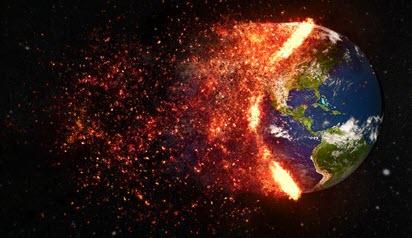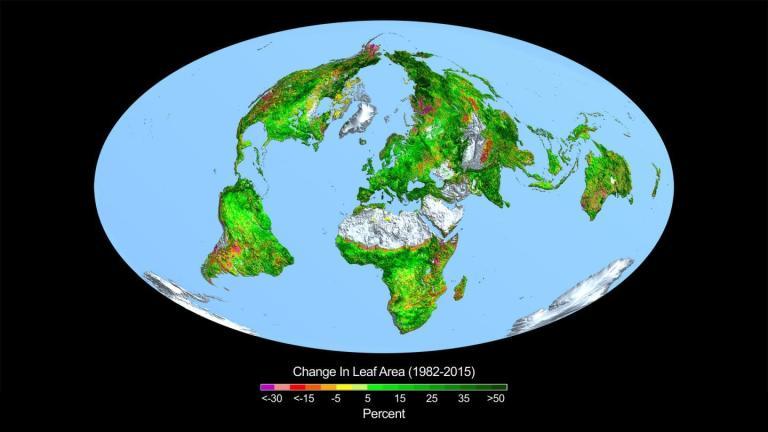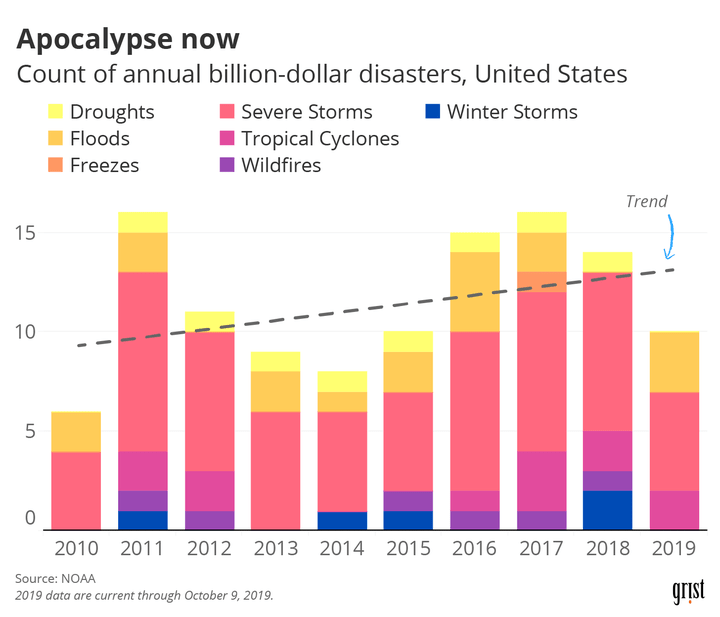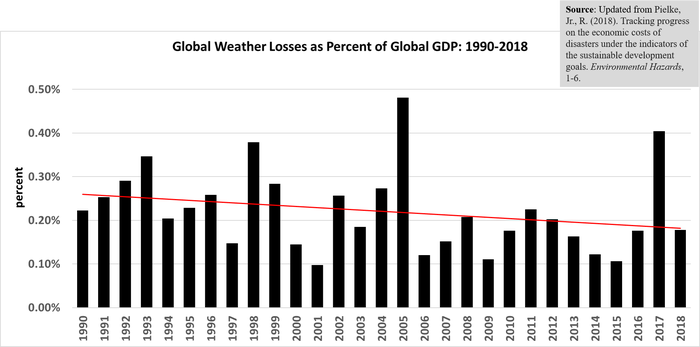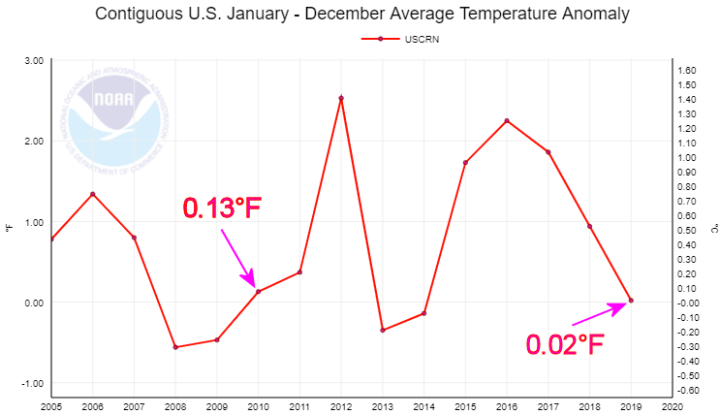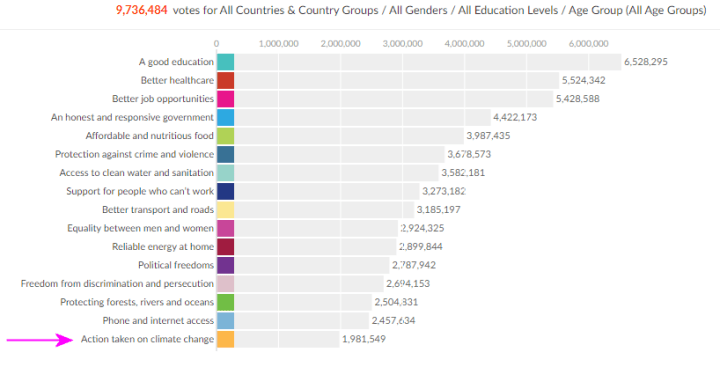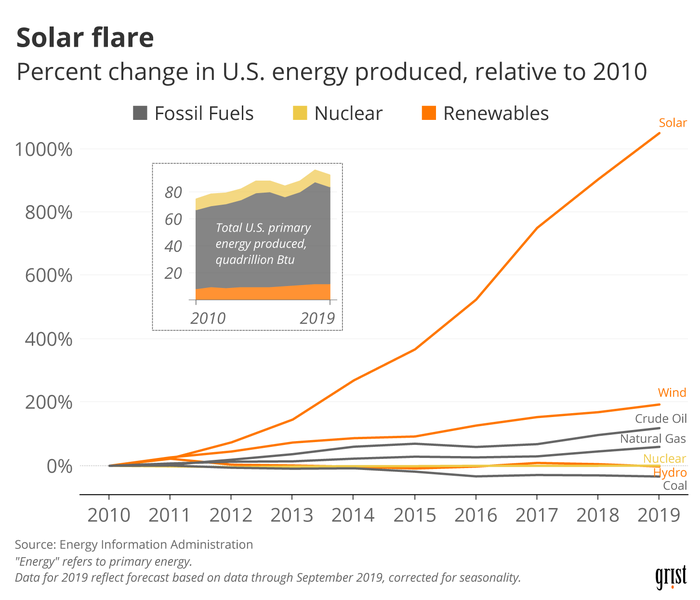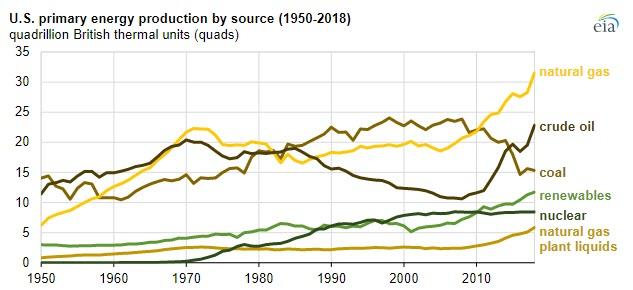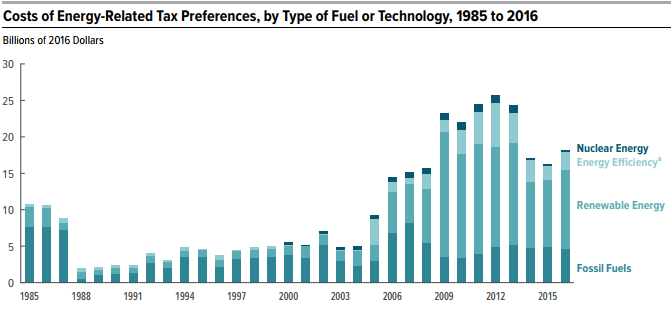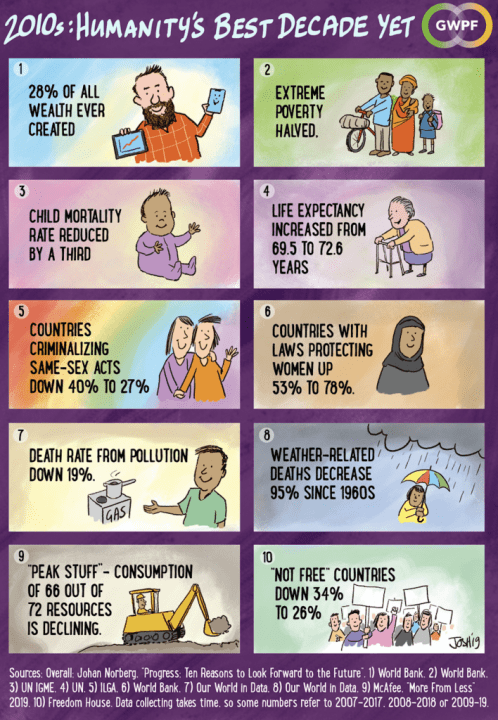Authored by Anthony Watts via WattsUpWithThat.com,
This article on Grist (h/t to James Taylor, The Heartland Institute) tries to point out how “terrible” the last decade was due to “climate change”. They write:
As this hottest-on-record, godforsaken decade draws to a close, it’s clear that global warming is no longer a problem for future generations but one that’s already displacing communities, costing billions, and driving mass extinctions. And it’s worth asking: Where did the past 10 years get us?
The seven charts below begin to hint at an answer to that question. Some of the changes they document, like the concentration of carbon dioxide in the atmosphere and the number of billion dollar disasters that occur each year, illustrate how little we did to reduce emissions and how unprepared the world is to deal with the warming we’ve already locked in.
https://grist.org/climate/we-broke-down-the-last-decade-of-climate-change-in-7-charts/
We can also provide 7 charts that illustrate the last decade of climate change, and they tell a different story…
What they say: 1. Atmospheric carbon dioxide rose by about 25 parts per million.
There’s no disputing that ambient CO2 has gone up in the atmosphere, however, that isn’t necessarily a bad thing. NASA, for example has this to say about the effects of that increased CO2 in study about CO2 and greening derived from satellite data.
From a quarter to half of Earth’s vegetated lands has shown significant greening over the last 35 years largely due to rising levels of atmospheric carbon dioxide, according to a new study published in the journal Nature Climate Change on April 25 2016
“We were able to tie the greening largely to the fertilizing effect of rising atmospheric CO2 concentration by tasking several computer models to mimic plant growth observed in the satellite data,” says co-author Prof. Ranga Myneni of the Department of Earth and Environment at Boston University.
“The greening over the past 33 years reported in this study is equivalent to adding a green continent about two-times the size of mainland USA (18 million km2)…”
https://www.eurekalert.org/pub_releases/2016-04/bu-cfg042216.php
This image shows the change in leaf area across the globe from 1982-2015. CREDIT Credits: Boston University/R. Myneni
Source: http://www.nature.com/nclimate/journal/vaop/ncurrent/full/nclimate3004.html
It seems the Earth’s biosphere is responding to increased CO2 in a positive way, that’s also undeniable.
What they say: 2. Climate change got expensive.
They cite this graph (produced by the Grist magazine):
And they say:
One of the best-established consequences of global warming is that it makes natural disasters, like fires and floods, more frequent and severe. In the 2010s, the costs of this consequence came into sharp focus as billion-dollar disasters struck the United States again and again.
But, that’s not true when you look at normalized weather disaster costs:
Source: Pielke, R. (2018). Tracking progress on the economic costs of disasters under the indicators of the sustainable development goals. Environmental Hazards, 1-6.
Dr. Roger Pielke Jr. makes note of this in Why Climate Advocates Need To Stop Hyping Extreme Weather
It appears that 2019, is on track to continue the record of good news. Robert Muir-Wood of RMS, a leading catastrophe modeling firm, wrote a month ago “Almost three months ago we passed a remarkable record in catastrophe loss. And yet no one seems to want to celebrate it. No banner headlines in the newspapers. . . The first half of 2019 generated the lowest catastrophe insurance loss for more than a decade.” Muir-Wood labelled 2019 “the year of the kitten.” With two months left, cross your fingers.
What they say: 3. More people accept the basic premises that it’s getting hot and that it’s our fault.
Well, you might think that if you believe the highly adjusted temperature data published by NASA GISS and [University of East Anglia’s Climate Research unit] on climate (ground zero for the embarrassing and revealing Climategate affair in 2009).
But when you look at unadjusted data, such as is produced by the state-of- the-art United States Climate Reference Network (USCRN) operated by NOAA, you get a wholly different idea about temperature over the last decade:
Graph annotated by A. Watts
Source: https://www.ncdc.noaa.gov/temp-and-precip/national-temperature-index/time-series?datasets%5B%5D=uscrn¶meter=anom-tavg&time_scale=12mo&begyear=2005&endyear=2019&month=12
That’s right, in the contiguous US, the temperature for 2019 was actually lower than for the start of the decade at 2010. The two peaks in 2012 and 2016 were from naturally caused El Nino events in the Pacific ocean. Granted, the USA isn’t the world, but the USA routinely gets blamed for all of the climate woes of the world, so the comparison seems a fair one. But really, where’s the climate crisis?
What they say: 4. But there’s a widening partisan divide when it comes to worrying about the environment.
Well that’s true, Conservatives generally think things through and look at fact based evidence compared to the liberal side, which seems to “feel” issues far more than they critically examine them.
But when people of all stripes worldwide are polled about it, such as the United Nations does, it comes in dead last as a concern:
Source: http://data.myworld2015.org/
It seems people worldwide would rather have education, food, honest government, better roads, and reliable energy than they would some climate action.
What they say: 5. Coal continued its death spiral.
Citing a Grist produced graph of data from the US Energy Information Administration (EIA) that they say depicts a “death spiral” for coal use, they say coal is on the way out.
Clayton Aldern / Grist
While that data is true, what they aren’t showing you is the rest of the story from the EIA:
Source: U.S. Energy Information Administration, Short-Term Energy Outlook
What is really going on here is that natural gas is replacing coal because it is more efficient, less expensive to maintain, and has a smaller footprint. It’s really a market driven business decision rather than a nod to environmental concerns.
What they say: 6. Solar skyrocketed, but fossil fuels still dominate.
Once again they cite a graph they produced from EIA data, and once again, it doesn’t tell the whole story.
Clayton Aldern / Grist
Gosh, it looks like the entire USA is being powered by solar energy! Hurray for environmentalism! Inconveniently, the reality is far different:
Source: U.S. Energy Information Administration, Monthly Energy Review
While renewables, including solar, have made gains, they still lag behind fossil fuels such as natural gas, crude oil, and coal in energy production in the USA. Without baseload (grid) generation by coal and natural gas, solar wouldn’t even work, since almost all solar installations are grid-tied – meaning that if the grid doesn’t have electricity, solar power can’t feed to it.
What they say: 7. While coal flatlined, the price of renewables dropped precipitously.
I wonder what the price of renewables would be if they weren’t propped up by your tax dollars? According to EIA data, fossil fuels are still far less expensive:
https://www.cbo.gov/system/files/115th-congress-2017-2018/reports/52521…
And there there’s this analysis.
The EIA estimates the two largest federal tax credit programs benefiting wind and solar paid out a combined $2.8 billion in 2016. These funds came through a tax credit worth 2.4 cents per kilowatt hour of power produced, as well as a deduction equal to 30 percent of a facility’s installation costs.
These two tax credits are set to expire at the end of 2021, though a permanent 10 percent investment tax credit for solar and geothermal installations would remain.
https://www.insidesources.com/us-still-subsidizing-renewable-energy-to-the-tune-of-nearly-7-billion/
That doesn’t include state tax credits, which are also substantial.
While some people at Grist believe there is more to worry about from climate change issues this past decade, the undeniable fact is We’ve Just Had The Best Decade In Human History.
Source: Matt Ridley, writing in the Spectator UK
How inconvenient for the eco-worriers at Grist.
